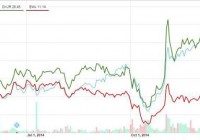The Best Japan ETF For The Long-Term, Hint: It’s Not DXJ
Summary I examine the Japan Hedged Real Estate ETF. I compared the performance of the Japan Hedged Real Estate ETF to the DXJ, and the un-hedged EWJ. Based on the policies of the BOJ, and Japan’s Pension fund, along with the underlying fundamentals I believe the Japan Hedged Real Estate ETF will be a long-term winner. In this article, I will be conducting an overview of a unique ETF that I believe is currently in the sweet spot for potential long-term gains. The WisdomTree Japan Hedged Real Estate ETF (NYSEARCA: DXJR ) I believe is worth considering because of the monetary stimulus that the Bank of Japan [BOJ] initiated in late October, in addition to increased buying of REITS and real estate equities from Japan’s Government Pension Investment Fund [GPIF]. DXJR Fund Facts Index Description The Index and the Fund are designed to provide exposure to Real Estate companies in Japan, while at the same time hedging exposure to fluctuations between the value of the U.S. dollar and the Japanese yen. [ DXJR Fund Page ] Assets: $35.3 million Expense Ratio: 0.43% SEC 30-Day Yield: 1.13% Inception Date: 4/8/2014 DXJR Performance I went to ETF.com and used their ETF Finder to see how the performance of DXJR compared to other Japan related ETFs. I excluded leveraged & inverse funds from my search, and found there were 19 Japan related ETFs. I compared the performance of DXJR since its inception, to the un-hedged iShares MSCI Japan ETF (NYSEARCA: EWJ ), and the largest hedged Japan ETF, the WisdomTree Japan Hedged Equity ETF (NYSEARCA: DXJ ). The chart below shows that since inception, DXJR has significantly outperformed EWJ, and has modestly outperformed the DXJ. The chart clearly shows that in an environment where the BOJ is easing, and Yen is weakening, a currency hedged ETF is the best option. (click to enlarge) Why DXJR Over DXJ? Someone may pose the question, why consider the DXJR which has only $35 million in assets, compared to DXJ which has over $11.5 billion in assets? Both ETFs will benefit from the GPIF allocating more to equities & real estate, and both will benefit from having a hedge to profit from the weakening Yen. The big difference that I believe will lead to DXJR outperforming DXJ is the supply of real estate. Supply Shortage For example, there was an article earlier this year from the WSJ, which, talked about an office space shortage, or this article from Japan Property Central about a severe shortage in apartments. Putting it in simple terms and stating the obvious, Japan is an island, therefore there is a limited supply of available land, and the only way to get around that fact is to build vertically. In a CNBC interview Daisuke Kitai who is the spokesperson at Nomura Real Estate Development stated: The availability of plots large enough to build new apartment complexes in central Tokyo is very limited. As I stated above, the only way to go is to build vertically, however, based on the statement from Mr. Kitai, it is easy to see why there is a shortage of apartments. Foreign Buying Mr. Kitai also brought up another source of demand that is leading to a shortage and that is increased buying from foreign buyers. Mr. Kitai made two statements, which show that there is demand from foreign buyers for Japanese real estate. Based on these statements its easy to see that foreign buyers will continue to properties in Japan, and with the yen weakening foreign buyers who are buying with a stronger currency will get more bang for their buck. Tokyo prices look relatively reasonable compared with similar quality properties in Hong Kong and Singapore. Of the seventy properties sold in the Toranomon Hills complex this summer, 30 percent were sold to foreigners, many from Hong Kong and Taiwan. Estate Planning The final reason why there is a supply shortage is the aging population of Japan is buying properties to minimize inheritance taxes. Also from the CNBC interview Kosei Ajima who is the general manager of property developer Mori Building Co stated: Many Japanese are buying an apartment as a gift to their children to minimize the eventual inheritance tax burden. With the population of Japan aging fast, I would expect there to be continued buying from Japanese citizens who are looking to leave their children with a lower tax bill. Closing Thoughts In closing, I believe the combination of the underlying fundamentals of the Japanese real estate, buying of REITS and real estate stocks by the GPIF, and the BOJ continuing to weaken the yen will lead to long-term gains for DXJR. For someone considering DXJR remember that the ETF has low volume, therefore it would be wise to use limit orders. Disclaimer: See here .
